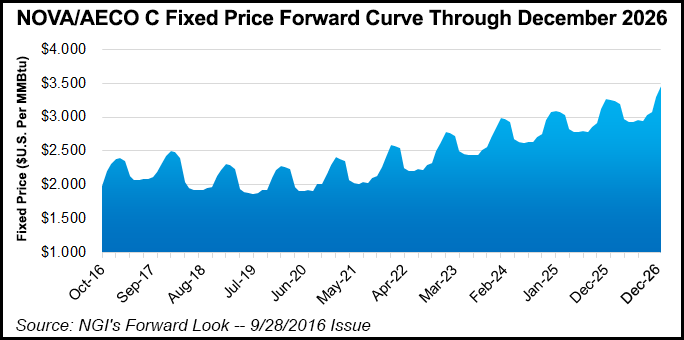Regulatory | LNG | NGI All News Access | NGI The Weekly Gas Market Report
Canadian Government’s OK of Pacific NorthWest LNG Called ‘Significant Milestone’
The Canadian government granted a hotly contested environmental approval Tuesday to a consortium led by Malaysia’s Petroliam Nasional Bhd (Petronas) to break into global liquefied natural gas (LNG) markets with unconventional production from British Columbia (BC).

“This is a significant milestone,” Pacific NorthWest LNG officials said after three federal cabinet ministers and BC Premier Christy Clark announced the ruling at a news conference.
However, no date was set to begin building the C$11 billion (US$8.5 billion) proposed terminal on BC’s northern Pacific Coast at Prince Rupert, which could eventually export 3 Bcf/d if all planned phases are completed. Earlier this month the National Energy Board (NEB) extended a construction permit for a related gas pipeline project, which gives the consortium until May 10 to decide whether to move forward (see Daily GPI, Sept. 16; Feb. 19).
The government decision fired the starting gun on a “total project review,” including costs of fulfilling 190 conditions on the environmental approval as well as the outlook for international LNG markets and prices, Pacific NorthWest said.
Conditions range from a landmark first cap on carbon emissions by a federally approved energy project, through fish and wildlife protections, to creating a standing environmental monitoring group including aboriginal community representatives.
No investment decision date was announced by the Pacific NorthWest group, which includes 62% partner Petronas, represented by Calgary subsidiary Progress Energy; along with Sinopec (15%), Japex (10%), Indian Oil (10%) and Petroleum Brunei (3%).
While an investment decision remains unclear, the regulatory approval stood out as a morale booster for the Alberta-based gas and oil industry. The decision was viewed as the first test of the year-old Liberal federal government’s willingness to stand up for economic development against native power advocates and opponents of fossil fuel projects.
The ruling followed a 30-month regulatory review that included more than 20,000, mostly negative, often repetitive commentary and opinion letters. Formal statements read out by the Liberal cabinet’s officers left no doubt that the government concluded the animosity was concentrated in a minority of the BC population.
“The Pacific NorthWest LNG Project will deliver thousands of good middle class jobs and will help pay for schools and roads and social programs that enrich people’s lives,” said Natural Resources Minister Jim Carr. “We are moving forward with natural resource development in a sustainable manner.”
Added Environment Minister Catherine McKenna, “The only way to get resources to market in the 21st Century is if they can be done in a responsible and sustainable manner. This decision reflects this objective.”
“The Pacific NorthWest LNG proposal will bring great economic benefit to middle class British Columbians and First Nations,” said Fisheries and Oceans Minister Dominic LeBlanc. “Department of Fisheries and Oceans scientists have conducted thorough reviews of proponent submissions at every step of the environmental assessment process and determined that the potential risks to fish and fish habitat can be mitigated.”
Clark, whose Liberal BC government held a special legislature session in 2015 to enact favorable taxes and other terms for Pacific NorthWest, called the federal approval “great news” for her province and the Canadian energy industry. Current forecasts by economic authorities including the NEB and Canadian Energy Research Institute predict that only LNG exports can pull the gas industry out of the doldrums and revive supply development in BC and Alberta (see Daily GPI, Jan. 27).
Construction of the proposed LNG terminal would trigger about C$7 billion (US$5.4 billion) in pipeline projects by TransCanada Corp. and its BC and Alberta supply collection network, Nova Gas Transmission Ltd.
Total investment by Pacific NorthWest LNG and its allies is projected to reach C$36 billion (US$28 billion), counting 30 or more years of horizontal drilling and hydraulic fracturing to tap BC shale deposits for more than 40 Tcf of gas.
Opponents of LNG export development immediately vowed to keep up the fight, calling the project approval a betrayal of federal Liberal election promises, native rights and west coast wildlife. Plans for an immediate appeal to the law courts were announced by a coalition of six aboriginal groups, named Skeena Corridor First Nations after the river and salmon migration route that runs through the Prince Rupert region.
© 2024 Natural Gas Intelligence. All rights reserved.
ISSN © 1532-1231 | ISSN © 2577-9877 | ISSN © 1532-1266 |
